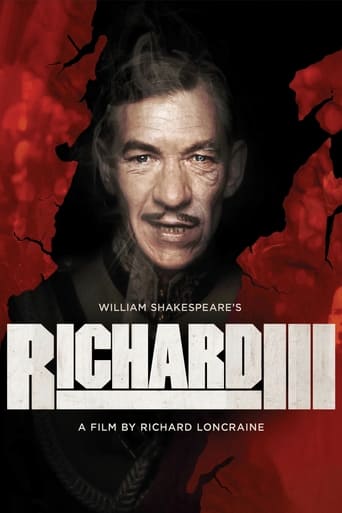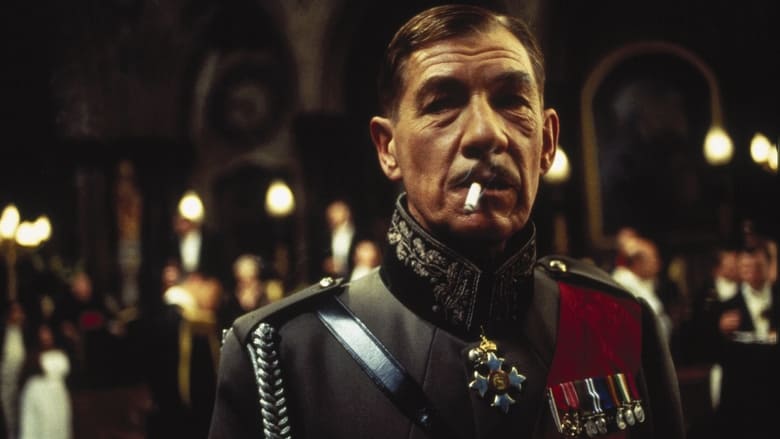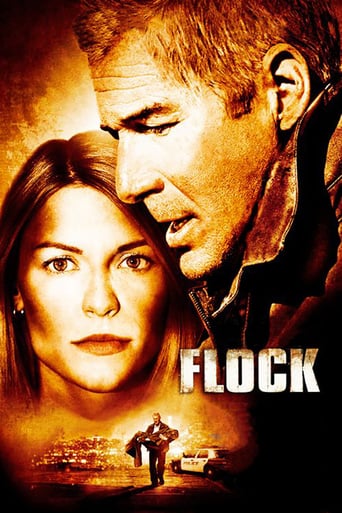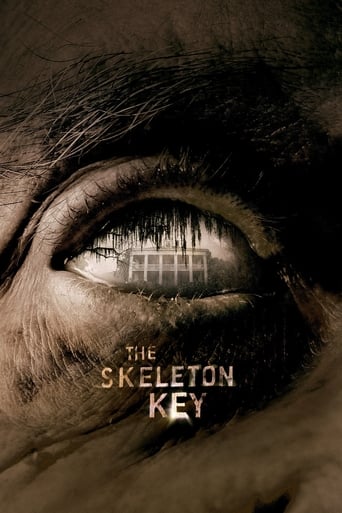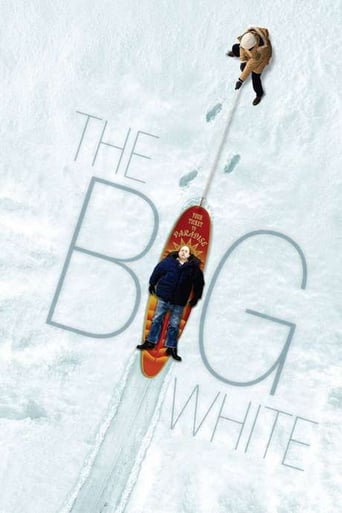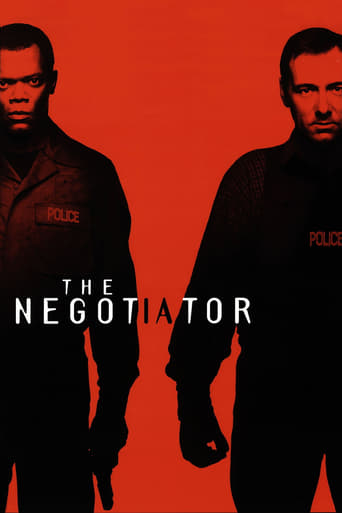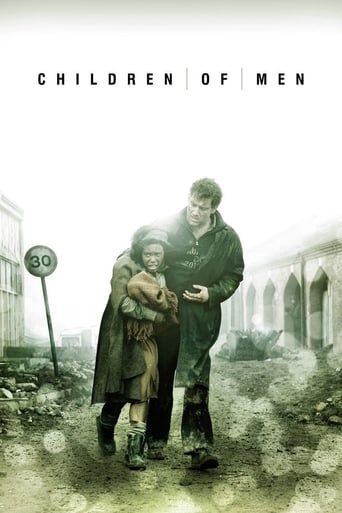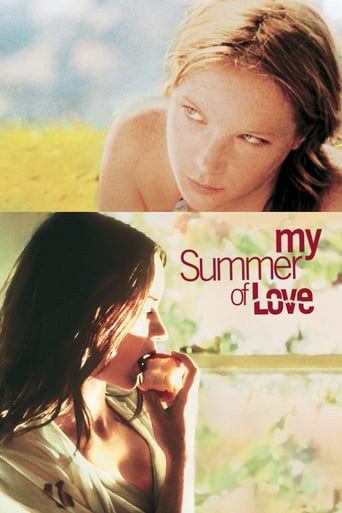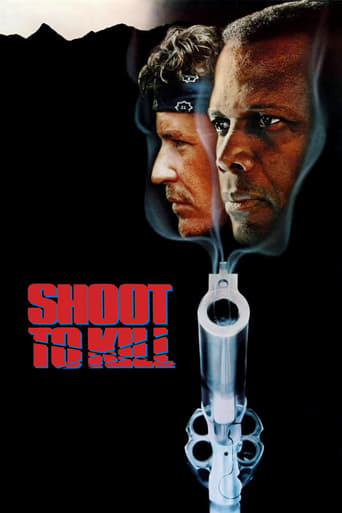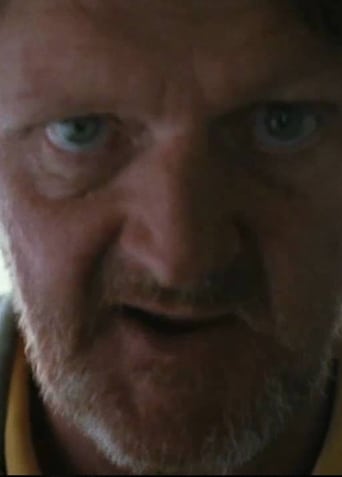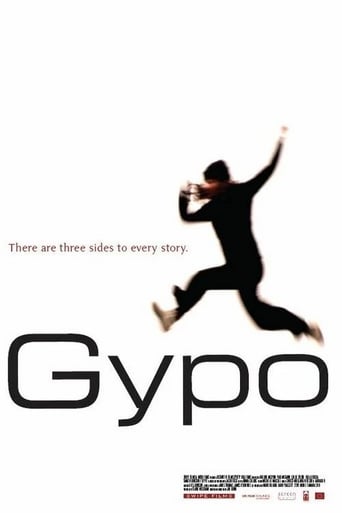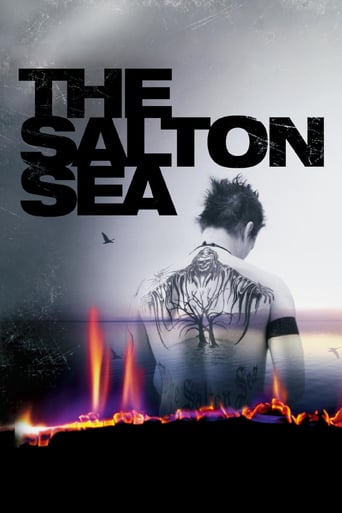Richard III (1995)
A murderous lust for the British throne sees Richard III descend into madness. Though the setting is transposed to the 1930s, England is torn by civil war, split between the rivaling houses of York and Lancaster. Richard aspires to a fascist dictatorship, but must first remove the obstacles to his ascension—among them his brother, his nephews and his brother's wife. When the Duke of Buckingham deserts him, Richard's plans are compromised.
Watch Trailer
Free Trial Channels
Cast


Similar titles
Reviews
recommended
This movie was so-so. It had it's moments, but wasn't the greatest.
There is, somehow, an interesting story here, as well as some good acting. There are also some good scenes
It's a good bad... and worth a popcorn matinée. While it's easy to lament what could have been...
When I first saw this adaptation of Richard III, I didn't care for it. I hated the way Shakespeare's dialogue is chopped into bits and scattered around randomly. I thought the period details were crudely overdone. (Must every character smoke cigarettes in every scene?) And I just couldn't picture an aging, feeble Ian McKellen as a brutal rampaging tyrant like Richard III.Over time, though, I've come to appreciate the little things. The amazing supporting cast and the sexy background moments, like Robert Downey's fling with the stewardess that ends like it's Friday the 13th! And the happy ending for Richmond and young Princess Elizabeth.And by the way, it's not one moment, but the whole character arc for Lady Anne (Kristin Scott Thomas) who falls under Richard's spell and gradually fades away into a swoon of almost living death. The way she's always in the background, taking pills at one moment, then gulping down liquor, then at the end actually injecting herself with drugs in the limousine, you sense how she just wants to forget everything and fade into sweet oblivion. Yet you also sense she would have loved Richard if he could have shown her any kind of human feeling. Kristin Scott Thomas is perfectly cast as the exquisitely frail and helpless beauty.
more than an innovative adaptation of the Shakespeare's play, it is an experience. an exercise of memory, a lesson of history, an admirable work who presents slices from a WWII in a special manner. story about power, it becomes testimony about the illness of a century by each of its dictatorship. story about tyranny, it is a warning and remarkable tool for remember the universal message of Shakespeare work. the cast, the music, the image - all is perfect. in few moments , the only problem becomes the forced context for the Shakespeare words. but the situation is saved by the spirit of play. more than an eccentric adaptation, great performances, it is pure history lesson. few scenes - strong and touching - are necessaries proofs.
Granted, this Richard III is not for everybody due to the updated setting. However, I am not one of those who says that any adaptation that doesn't stick to the original setting and such is immediately rubbish. I do find that approach unfair, and have always thought considering that we are talking about different mediums here that adaptations should be judged on their own terms. Because on its own terms, this Richard III is excellent, not as good as Olivier's film but then again it is always a tough act to come up with something equal to film as amazing as Olivier's.The only things that I didn't like so much were that Edward's speech being cut meant that John Wood had literally nothing to do and Rivers' death scene for me didn't make sense. Also, Robert Downey Jnr's role is small and important, but at the same time I did find him too American and this jarred.However, the updated setting I had no problem with. As well as the fact that it's clear what the period is, the sets and costumes are beautiful and evocative, and Richard's entrance in a tank through the wall is incredibly dynamic even for a film adaptation of Shakespeare.Trevor Jones' music fits perfectly with the mood, haunting, poignant and tense all in one. The song set to Christopher Marlowe's words at the ball surprisingly likewise. The dialogue is as ever brilliant, of course there are cuts which is necessary considering the running time, but the dry yet inspired delivery of "well I'm not made of stone" really stands out. It was very effective at how Richard looked into the camera as if talking directly to the audience, this did help us to engage with the characters and the story. The story is daringly told and compelling, with a powerful and hilarious if not quite epic final scene and the touching morgue scene.Richard has always been a controversial yet enigmatic character, and Ian McKellen plays him superbly. He gives the character humour and charm yet also treachery and menace, and does so in a mesmerising way. Kristin Scott Thomas is a moving Anne, and Annette Bening is a fully-realised and sympathetic Elizabeth. Maggie Smith commands her scenes in whatever scene she appears in, and Jim Broadbent's Buckingham is wonderfully sly. Adrian Dunbar is effectively eerie and ruthless as is Tim McInnery, and Nigel Hawthorne affects as Clarence. Donald Sumpter's Blackenbury is nice to spot.All in all, an excellent Richard III if not for all tastes. 8.5/10 Bethany Cox
King Richard III didn't live in the 1930's, and William Shakespeare didn't write in the 20th century. This historical figure lived in the the late Middle Ages, and Shakespeare wrote in the very late 16th and early 17th centuries near the end of the Renaissance. To snatch an historical figure 600 years out of his historical context and a corresponding play 450 years out of its theatrical and artistic context I believe loses the entire point of Shakespeare's original play. Taking bona fide masterpieces of theater and setting them down into another period is certainly in vogue these days, and victims have included other masterworks, including those by Wolfgang Mozart/da Ponte and even Richard Wagner. It is a practice I question, if only to say they simply are not the original works as intended by the artist-creators. They may be compelling and interesting but exist as a new work with elements of the original but they are NOT equivalent to the original. In this case, Richard III is set in the early 20th century during the period when the Nazis ruled Germany.Now, certainly any artist is free to do whatever he or she wishes with a play or opera which is in the public domain. But just because these things can be done, the question is whether they should be done, or at least to acknowledge they are fundamentally altering the original. Unfortunately however, this practice of "contextual re-appropriation" for lack of a better term is often rationalized in such a way to make it more real for contemporary audiences. Again, that's fine, but it is a morphing of the original work into something else. Making Richard III into a European Nazi-sympathizer of the 1930's is reshaping Shakespeare's original vision into something quite distinctive from a 16th-century interpretation of a 15th-century historical figure. The bottom line: no matter what it is, and not matter how well it works on its own terms, it is not really Shakespeare anymore. Now granted, I am not saying it should never be done, but it is not Richard III as conceived by William Shakespeare.Consider the following: Could Tennessee Williams' A Streetcar Named Desire be transferred to early Colonial America? Or how about Neil Simon's "The Odd Couple" set in Elizabethan England, with Oscar as a tavern owner and Felix as a cobbler? Gilbert and Sullivan's "The Mikado" could be easily set in a host of other eras, such as the Middle Ages or even Antiquity. Or maybe a film version of Mark Twain's "Tom Sawyer", keeping all the dialog, but set in the ghetto of New York in the 1970's. Again these "morphings" could possibly work on their own terms, but they wouldn't be Williams, Simon, Gilbert-Sullivan, or Twain anymore. They would be something else, and I think something would certainly be lost by placing them outside their contexts. Part of what makes them rich and appealing has to do with their original eras. Funny, though, no one would dare do this to Williams or Twain, but Shakespeare, Mozart and Wagner are constantly being re-contextualized. Maybe for myself after watching this film is that I never saw King Richard III of England. I saw a new character possibly inspired by Richard III but not Shakespeare's Richard III. Richard III lived in the late Middle Ages. He didn't have access to machine guns, tanks or telephones. He wouldn't have understood the terms fascism or communism. And he certainly would not have been smoking a cigarette. And to add one further point, there are a myriad of films set during World War II. Is it really necessary to take a Shakespeare play and put it there as well? As it is, there are not as many big-budget productions of Shakespeare plays produced after 1970 set in their original context as their should be, barring the wonderful BBC productions. There are plenty of films depicting Europe before, during and just after the Nazis.Because I prefer my Shakespeare, my Mozart and my Wagner produced in ways more closely adapted into what the authors had intended, which includes their historical context, I am not a good judge of this kind of material. Richard III to its credit may work on its own terms. But the use of the original Shakespearean language for a setting in the 20th century doesn't make much sense to me, and I don't really see the point. West Side Story, which was Romeo and Juliet set in 1950's New York, is a perfect example of how Shakespeare can be updated without messing with the original. Instead of the actors saying lines in Elizabethan English, new dialog was written which was contextually more appropriate for the mid-20th century, particular white gang members and Puerto Ricans in New York City. I think I would have preferred a newly written work with the plot inspired by Richard III rather than thrusting Shakespeare's blank verse across several centuries and putting it where it really doesn't belong.

